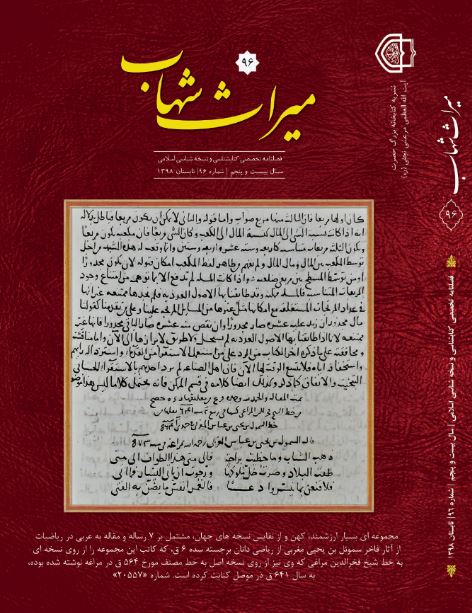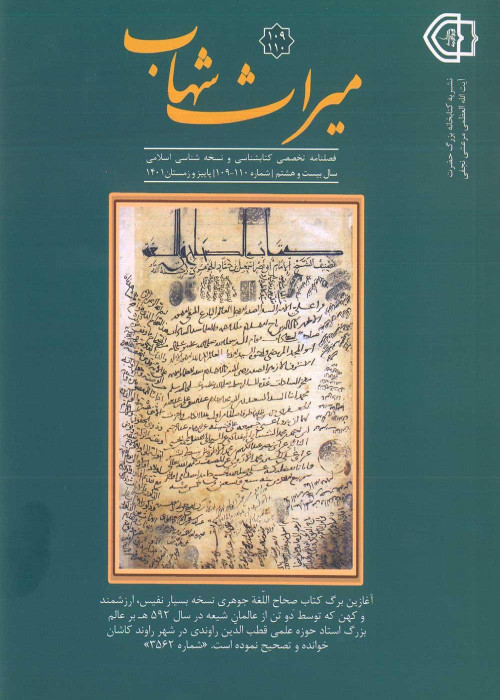فهرست مطالب

نشریه میراث شهاب
پیاپی 96 (تابستان 1398)
- تاریخ انتشار: 1399/02/01
- تعداد عناوین: 10
- فهرست نسخ ماندگار
-
صفحه 3
- مقالات
-
صفحه 21
- نسخه شناسی
-
آران در آینه مخطوطات / بخش یکم: نسخه های خطی نفیس کتابخانه امامزاده هلال آرانصفحه 65
-
صفحه 103
-
صفحه 157
- تصحیح متون
-
صفحه 201
-
صفحه 217
-
صفحه 229
-
Page 3
In this article, two precious manuscripts of the 10th century are elaborately introduced. These have been endowed by Āyatullāh Shahāb al-Dīn Mar‘ashaī to Lady Fāṭima Ma‘ṣūma (s) Library. The first manuscript involves seven treatises by Muḥaqqiq Karakī and others, while the second one entails two treatises.
Keywords: Mar‘ashaī_Sayyid Shahāb al-Dīn – endowments_Bookendowment_Lady Fāṭima Ma‘ṣūma Library – manuscripts_Preciousmanuscripts_Muḥaqqiq Karakī – works -
Page 21
The author has presented and analyzed new findings about several topics, including the travels of Ḥusayn b. ‘Abd al-Ṣamad ‘Āmilī, Zayn al-Dīn ‘Āmilī Shahīd Thānī, the biographical resources of the Twelver Shī‘a scholars of the Safavid era, the manuscripts of Khāja Muḥammad Pārsa Library in Bukhārā, a summary of Akhawān al-ṣafā treatises, As‘ad Afandī’s manuscript, a note by Shaykh Ṭūsī, and Sahla mosque.
Keywords: Āmilī_Ḥusayn b. ‘Abd al-Ṣamad_Shahīd Thānī_Pārsa_KhājaMuḥammad – library_Akhawān al-ṣafā treatises (book)_Shaykh Ṭūsī_Sahlamosque -
Page 65
The author first refers to the existence of 357 manuscripts in Imāmzāda Muḥammad Hilāl Library in Ārān, and notes that some of them are precious manuscripts. He then describes the criteria of preciousness, and introduces four bibliographers who have made great efforts to promote Ārān manuscripts. Next, he elaborately introduces 13 precious manuscripts of the aforementioned library, in a way that in line with their introduction, other precious manuscripts of those books which exist in other libraries are also introduced. The manuscripts of the books al-Khilāf by Shaykh Ṭūsī in the 6th century, Īḍāḥ al-Fawā’id by Fakhr al-Muḥaqqiqīn and Muhaj al-Da‘awāt by Ibn Ṭāwūs in the 8th century, and Irshād al-Adhhān by ‘Allāma Ḥillī in 804 LH are some of these precious manuscripts.
Keywords: Imāmzāda Muḥammad Hilāl Library – manuscripts_Ārān –libraries_Precious manuscripts_Al-Khilāf (book)_Īḍāḥ al-Fawā’id (book)_Muhaj al-Da‘awāt (book)_Irshād al-Adhhān (book) -
Page 89
The author has found a manuscript from Anis al- ṭālibīn in mysticism written by Ṣalāḥ b. Mubārak Bukhārī (d. 793 LH) in the library of Āyatullāh Mar‘ashī Najafī. He thinks that ‘Alī Akbar Dihkhudā (12571334- SH) has relied on this manuscript in writing the book Lughat-nāmih. Based on observing this manuscript and its gloss, the author proves his claim; moreover, he shows its dictation and paleography features. Then, he suggests that other manuscripts of the texts referred by Dihkhudā be introduced.
Keywords: Lughat-nāmih (book) – sources_Anis al-ṭālibīn (book)_Bukhārī_Ṣalāḥ b. Mubārak_Manuscripts – Ninth century_Documents of Lughat-nāmih_Dihkhudā_‘Alī Akbar -
Page 103
The author has provided a list of roughly one hundred titles published and unpublished Persian and Arabic books and treatises in the science of kinship which is from letter A to letter R, based on Persian alphabet. He also has delivered a brief explanation on publication features or manuscripts of the work, literature of kinship studies, and the benefits of such studies.
Keywords: kinship studies – Bibliography_kinship studies – benefits -
Page 157
The author has provided some autobiographies related to the Shī‘a scholars from the 12th to 14th centuries, namely Shams al-Dīn Matājī Kujūrī (1327 LH/1370 SH), Sayyid Muḥammad Kāḍim Jazāyirī Shūshtarī (1339 LH/1361 SH), Muḥammad ‘Alī Fashandī (1271 LH/ after 1323 LH), Sayyid Ya‘qūb Lāsimī Lārījānī (d. 1310 SH), and Mīrzā Abū Ṭālib Iṣfahānī (11661220- LH). In addition to the autobiography, the author presents new findings on each respective author’s life and works. Moreover, he has elaborately introduced some books, including Miṣbāḥ al-mutahajjidīn by Ibn Rāshid Ḥillī (9th century) and the collection of poems by Maddāḥ Kharaqānī (d. 1393 LH). This volume of information on these scholars and books can rarely be found in other works.
Keywords: Autobiographies_Shī‘a scholars – 12th century_Shī‘a scholars –13th century_Shī‘a scholars – 14th century_Miṣbāḥ al-mutahajjidīn (book)_Collection of poems by Maddāḥ Kharaqānī (book)_Matājī Kujūrī_Shams alDīn – biography_Jazāyirī Shūshtarī_Sayyid Muḥammad Kāḍim – biography_Fashandī_Muḥammad ‘Alī – biography_Lāsimī Lārījānī_Sayyid Ya‘qūb –biography_Iṣfahānī_Mīrzā Abū Ṭālib – biography -
Page 197
This article is an introduction and review of a short opinion seeking document in eighth century on the issue of endowment in which Muḥammad b. Shahāb al-Dīn Kizdarī ῌanafī has answered three questions with reference to Hanafite jurisprudence. This opinion seeking has been published based on the manuscripts from the mausoleum of Shaykh Ṣafī al-Dīn Ardabīlī.
Keywords: Endowment_Hanafite jurisprudence_Kizdarī_Muḥammad_Hanafite scholars – eighth century_Persian documents_Ardabīl – mausoleumof Shaykh Ṣafī al-Dīn -
Page 201
The author has edited the text of the inscribed treatise of Inshā‘allāh by Sayyad ῌasan b. Dildār ‘Alī Lākhanuy (d. 1260 LH), Indian Shi‘a scholar, based on its only manuscript, and has provided a short biography of the writer. In this treatise, Sayyad explains the expression Inshā‘allāh (God willing) from literary, rhetorical, and theological aspects.
Keywords: Treatise of Inshā‘allāh (book)_Lākhanuy_Sayyad ῌasan (1205-1260 LH)_Biography_Indian Shi‘a scholar – Thirteenth centrury_Inshā‘allāh– literary aspect_Inshā‘allāh – theological aspect_Shi‘a manuscripts – India -
Page 217
This article contains the text of the ode ending in “sh” sound by Amrī Shirāzī (d. 999 LH), the Ismailian poet, in reference to the anthology of manuscripts of the parliament. This ode is composed as a pastiche of the ode of Marāt al- ṣafā by Khāqānī. In addition to reviewing other poems ending in “sh” sound, the author has provided the biography of Amrī.
Keywords: Amrī Shirāzī (d. 999 LH) – biography_odes ending in “sh” sound_Marāt al-ṣafā (ode)_Poets of Iran – Shiraz_Manuscripts – Persian literature_Literature of Iran – tenth century


